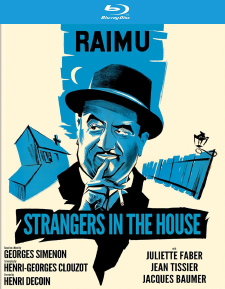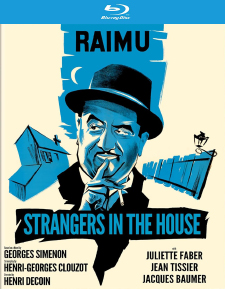Strangers in the House (Blu-ray Review)

Director
Henry DecoinRelease Date(s)
1942 (August 8, 2023)Studio(s)
Continental Films/Gaumont (Kino Lorber Studio Classics)- Film/Program Grade: B+
- Video Grade: A
- Audio Grade: A
- Extras Grade: B-
Review
Seemingly unmissable, Strangers in the House (Les Inconnus dans la maison, 1942) is a French crime film written by Henri-Georges Clouzot based on a 1940 novel by Georges Simenon directed by Henri Decoin and starring the great actor Raimu. The film, though, is not quite what one might have expected. It’s sort of like Billy Wilder’s delightful Witness for the Prosecution (1957)—larger-than-life attorney with a life-threatening vice, extravagant courtroom theatrics, and a wry sense of humor throughout.
It was made during the Nazi Occupation and, possibly coincidentally, generated controversy for alleged anti-Semitism regarding one character, with the film briefly banned after the war until it was altered to remove its offending moments. (It’s this altered version that has been restored and now on Blu-ray.) The character is one of a group of teenagers around which its mystery revolves. They are, in effect, juvenile delinquents, at least the French equivalent of American ones. They’re not as hardened as either the Dead End Kids before them or Blackboard Jungle types that wouldn’t appear in Hollywood movies long after. In any case, it’s rather unexpected if not bizarre to see wayward teenagers of this type in a 1942 film made in Vichy France.
In a rundown mansion in a provincial town—possibly pre-war, as there are no signs or any mention of Germans—once-respected attorney Hector Loursat (Raimu) has become a reclusive drunkard since his wife left him for another man 18 years ago. He lives with his nearly adult daughter, Nicole (Juliette Faber), though they have a distant, nearly loveless relationship, each secretly longing for a reconciliation.
In the middle of the night, Hector hears gunshots upstairs and spots a shadowy figure fleeing, along with the body of a dead man lying on a bed in the attic. He wakes up Nicole but it’s pretty obvious she was actually dressed and wide awake while all this was going on. Hector calls the police and soon the corpse is identified as one “Big Louis,” an unsavory character with a long criminal record.
It’s clear to Hector and the police that the dead man is somehow connected with a gang of teenagers that Nicole hangs out with, she being the only girl and thus desired by its members. The police suspect Émile (André Reybaz), Nicole’s boyfriend of the deed. Hector sobers up and agrees to represent Émile in court.
Gradually the we learn that the gang started out innocently enough, with initiations to the group beginning with small dares like the theft of lighters and such, but which soon escalated to bigger game like stealing cars. So what’s their connection to Big Louis? And who is the killer?
The juvenile delinquents of Strangers in the House may leave viewers a little nonplussed. They all wear ties and jackets, style their hair conservatively, and are cultured and well-mannered, hardly Vic Morrow in Blackboard Jungle or Leo Gorcey in anything. One of the peculiar aspects of the film is that the crime itself is not shown, nor are there any flashbacks to what happened, making this a very remote crime for the audience. Further, several of the gang members look rather alike, so even by the end of the picture, I was a little confused about exactly what had occurred and why, even with Hector’s Perry Mason-like reveal of the True Murderer. Further, the second half of the story is mostly courtroom melodrama, and the legal procedures and pageantry therein (more like the Old Bailey than American courtrooms) may be unfamiliar to non-French viewers. It’s all rather unsatisfying for these reasons.
One of the boys is played by Marcel Mouloudji, and originally his character was called “Ephraïm Luska.” Somehow, his Jewishness and how it was depicted generated controversy and when the film was re-released in France they brought back several original cast members to re-loop dialogue. This included changing that character’s name to “Amédée Luska” and removing any references to his being Jewish. Based on this altered version alone, one gets no sense of anti-Semitism or how it might have arisen in the original release version.
Continental Films, which produced Strangers in the House, was the sole authorized film company of Nazi-occupied France, and the anti-Semitic characterization of Luska did not appear in Simenon’s novel but rather was added/altered for the film. Screenwriter Clouzot apparently was not anti-Semitic himself—indeed, he was fired from UFA Studios some years before after refusing to disassociate himself from Jewish producers—so maybe this was done at Continental’s (i.e., the Nazi’s) insistence.
Regardless, the film is primarily a vehicle for Raimu in much the same way Witness for the Prosecution was for star Charles Laughton—though the character is more like Laughton’s in Hobson’s Choice. Admired by the likes of Alec Guinness, Dietrich, and Orson Welles—perhaps Welles’s Falstaff exhibits some of that influence—Raimu (1883-1946) mostly did comedies under pre-war directors such as Pierre Colombier, Marcel Pagnol, and Sacha Guitry. Strangers in the House was seen as something of a departure for Raimu, possibly because he’s in a drunken haze for so much of the story, coming to life only during the last 10 minutes or so of the film.
Kino’s Blu-ray of Strangers in the House sources a 2K restoration completed by current French owner Gaumont. The image is excellent for an Occupation-era title with good detail and strong blacks. The DTS-HD Master Audio (mono, French only) is likewise impressive, and the optional English subtitles are excellent. Region “A” encoded. Supplements include an original French trailer and a new audio commentary track by critics Howard S. Berger and Nathaniel Thompson.
Not exactly what I was expecting but worthwhile, Strangers in the House is recommended.
- Stuart Galbraith IV

